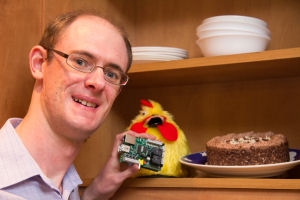Keeping to your New Year resolutions with PiFace
08 Jan 2013
University scientists have come up with a unique deterrent for dieters who are tempted to break their New Year resolution – a talking, tweeting chicken guarding your cupboards to shame them into abstaining.

The chicken, which not only barks out orders to sneaky snackers, but even tweets that person’s Twitter account to publicly shame them if they stray, uses a Raspberry Pi – a tiny, single-board computer – and the appropriately-named PiFace – an add-on which powers real-life applications and was developed by Dr Andrew Robinson with the University’s Investing in Success funding.
The two gadgets are the simplest and most user-friendly ways for computers to interface with the world, and are being used by University scientists to inspire the next generation of computer whizzkids.
The credit-card sized computers have a vast range of potential applications that will get young people fired up for computing. As well as the cupboard watcher, the University has helped youngsters make birdboxes that tweet and photograph birds, control Scalextric cars and build interactive toys that react to the weather. London Zoo is also interested in collaborating to record animal movements.
Dr Robinson and his School of Computer Science team have run a series of workshops for schoolteachers aiming to transform the teaching of computing in schools and also some workshops for children.
Dr Robinson was amazed by the response of children: “It really fired their imagination.
“After seeing what Raspberry Pi and PiFace could do we had suggestions including an automated insulin monitor that can dial 999, and another that automatically reorders food when it detects the cupboard is bare.
“One child even came up with a design for a device that politely reminds you to put the toilet seat down after use. I was really blown away with what they came up with.”
His colleague Dr David Rydeheard added: “This is an exciting development, taking computing out of its box and allowing schoolchildren to play with the science of computing."
- For a PiFace tutorial visit: http://www.youtube.com/watch?v=s02n7juVZaY
